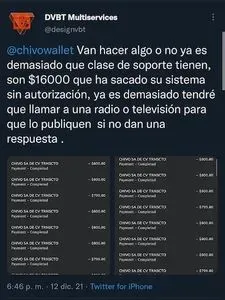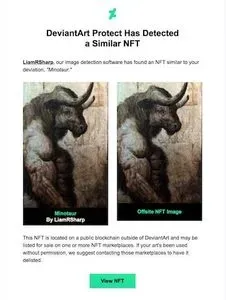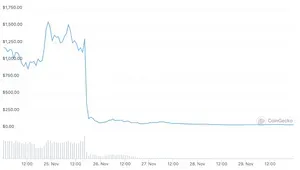Traders hoping to get in on the "Monkey Kingdom" NFT collection are duped by a scam link in the project's official Discord
Either a rug pull or a hack drains at least $1.8 million from Bent Finance
Dozens of users report money disappearing from their El Salvadoran Chivo Wallet accounts
Grim Finance is exploited for $30 million
Adidas learns the hard way that limiting the number of NFTs one person can buy is hard
Prominent comics artist says continuous theft of his work for use as NFTs may force him to close his DeviantArt gallery
Multiple artists report OpenSea automatically closing their support tickets reporting stolen artwork; OpenSea removes ability to report
S.T.A.L.K.E.R. 2 receives so much fan pushback on planned NFTs that the studio scraps the idea within a day
NFT collector who owns the NFT associated with the Bored Ape artwork used in this site header would like me to stop using "their" ape
Melania Trump announces an NFT collection which will begin with a painting of her "cobalt blue eyes"
Tweet from a crypto miner answers the question of where all the GPUs went
Another typing error proves costly to an NFT collector
Laurent Correia rug pulls $960,000 with his abandoned "Billionaire Dogs" NFT project
The project had an underwhelming reception, and the team quickly decided to reduce the supply of available NFTs from 6,500 to 2,000. Two days after launch, the funds were transferred out of the project wallet and to various addresses, including $400,000 which went to Correia. The project also deleted their website, Discord, and Twitter account that week.
Correia, for his part, has continued to post on his "Laurent BILLIONAIRE" Instagram account, where he shows off his private jet and tropical vacations with no mention of the Billionaire Dogs Club. His "NFT" Instagram story shows his pricey NFT purchases beginning on January 14.
A hacker racks up a $45,000 AWS bill for their victim, only to generate $800 worth of Monero
Bug in major cryptocurrency trackers shows wildly inaccurate data
Fans are outraged when the Twitter account of now-deceased Stan Lee shills an NFT
Artist Loish searches her name on OpenSea and finds 132 NFTs created from her artwork without permission
A collection of NFTs seeks to profit off the murder of George Floyd, with no apparent connection to or approval from his family
Vulcan Forged users lose a collective $135 million in hack
The Seattle Kraken NHL team, whose home stadium is named the Climate Pledge Arena, raise eyebrows with an NFT release
Typing error costs NFT trader nearly $300,000
Fable creator Peter Molyneux announces an NFT game where you run a company town
Cryptocurrency exchange Ascendex hacked for $77 million
McDonalds NFT project overshadowed by a possible link to a racial slur
Crowdfunding website Kickstarter announces it will abandon its current platform in favor of a blockchain implementation
A "decentralized exchange", dYdX, is taken down in an AWS outage
Ubisoft announces it will be shoehorning NFTs into its Tom Clancy game
- "Ubisoft's NFT Announcement Has Been Intensely Disliked", Kotaku
- "Gamer-hate: Ubisoft’s new NFT project video gets 96% dislike ratio", Cointelegraph
- "Ubisoft's first NFT plans make no sense", Ars Technica
- "Ubisoft Devs Don’t Understand Company’s NFT Push, Either", Kotaku
- "No One’s Buying Ubisoft’s Garbage Ghost Recon NFTs", Kotaku
8ight Finance completely drained after private key leak
WildWorks angers its fans by announcing it will be moving into crypto gaming
WildWorks later split Cinder into a separate company, Cinder Studios. However, in early 2023, the studio shutdown, giving its employees no advance notice that they would soon be out of a job.
Coindesk writer Andrew Thurman says the quiet part out loud
Polygon loses $2 million to a vulnerability
Tether mints $3 billion in two weeks
Hackers steal about $200 million from BitMart
Wikipedia founder Jimmy Wales angers some in the Wikimedia community by announcing he will be auctioning off an NFT representing the first ever edit
SEC charges individual with two fraudulent crypto schemes
- "SEC Charges Latvian Citizen With Digital Asset Fraud", U.S. Securities and Exchange Commission
CODEX, a decentralized publishing platform, aims to artificially constrain access to books
$120 million is stolen from BadgerDAO
NFT collecter friesframe has a Bored Ape and several other valuable NFTs stolen
$31 million stolen from MonoX in smart contract bug
A project called "Unvaxxed Sperm" combines COVID-19 misinformation and memecoins
Either a rugpull or massive communication failure ends in disaster for most holders of SnowdogDAO's token
- "Avalanche’s first memecoin SDOG ends in a $30M possible rugpull", Cryptoslate
- "OlympusDAO Fork Snowdog Hit By 90% Crash", Crypto Briefing
Alleged serial scammer launches "MetaWorld" project for at least the third time
SEC charges individual with two unregistered securities offerings related to crypto
- "SEC Charges Promoter with Conducting Cryptocurrency Investment Scams", U.S. Securities and Exchange Commission
Senate committee demands answers from stablecoins including Tether
NFT creator makes more than $7.5 million from artwork he doesn't own
Game developers are forced to recreate their entire game after a bug is discovered
A DAO raised more than $40 million to try to buy a copy of the United States Constitution, failed, and then stumbled chaotically to its end
- "Crypto collective raises $40 million to buy rare copy of U.S. Constitution", Fortune
- "Crypto collective loses bid to buy rare copy of U.S. Constitution", Fortune
- "ConstitutionDAO Is Shutting Down After Unrelenting Chaos", Vice
- "'Buy the Constitution' Aftermath: Everyone Very Mad, Confused, Losing Lots of Money, Fighting, Crying, Etc.", Vice
Someone mints an NFT of 100 stolen furry profile pictures and sells it for $100,000
Chinese police bust Filecoin miner-related Ponzi scheme
Filecoin mining became popular in China after Filecoin's 2018 initial coin offering, and Ponzi schemes and scams based around the token also emerged. Mostly, these involved selling poor equipment or soliciting investment in so-called mining operations that promised exaggerated returns.







































